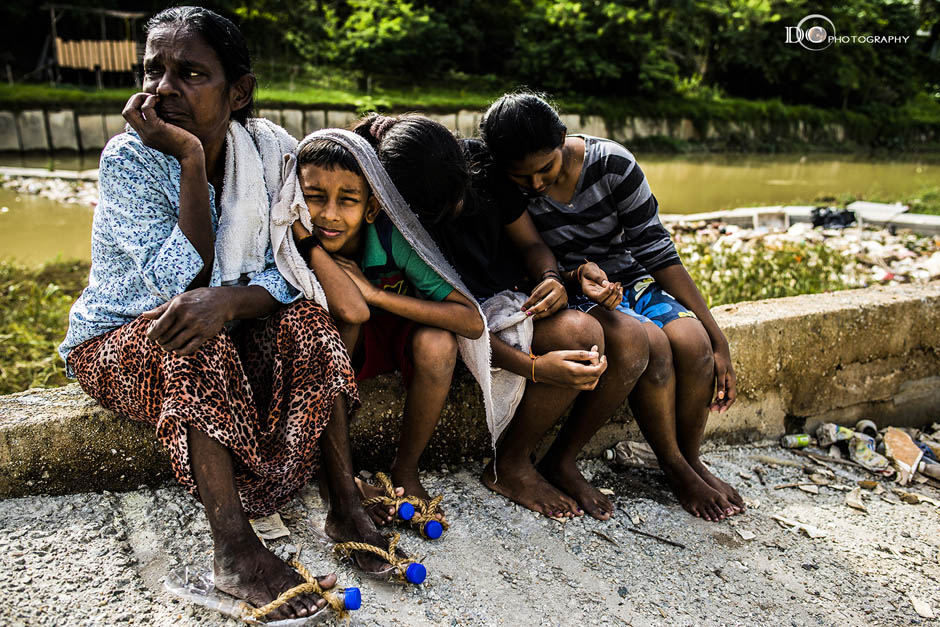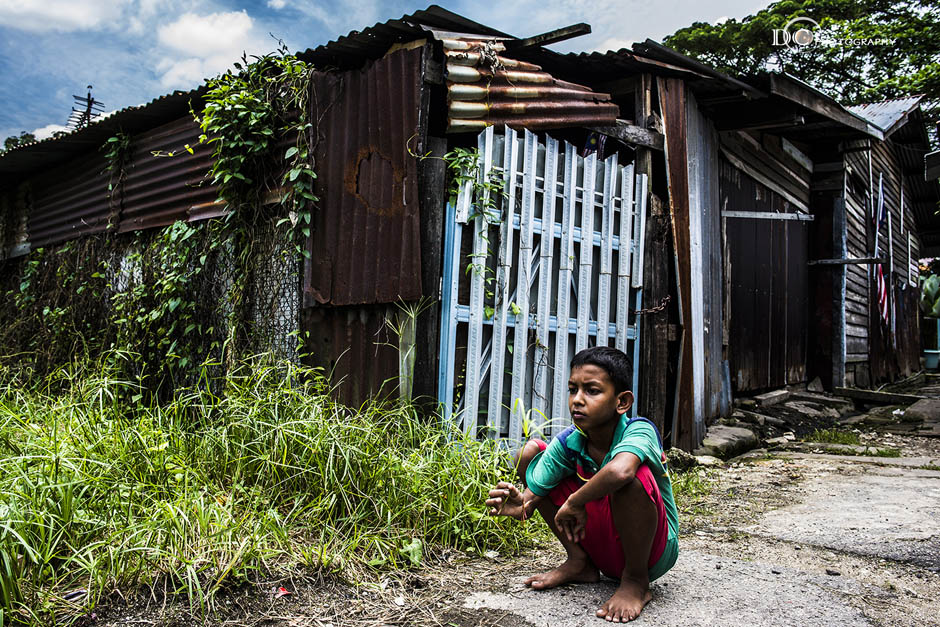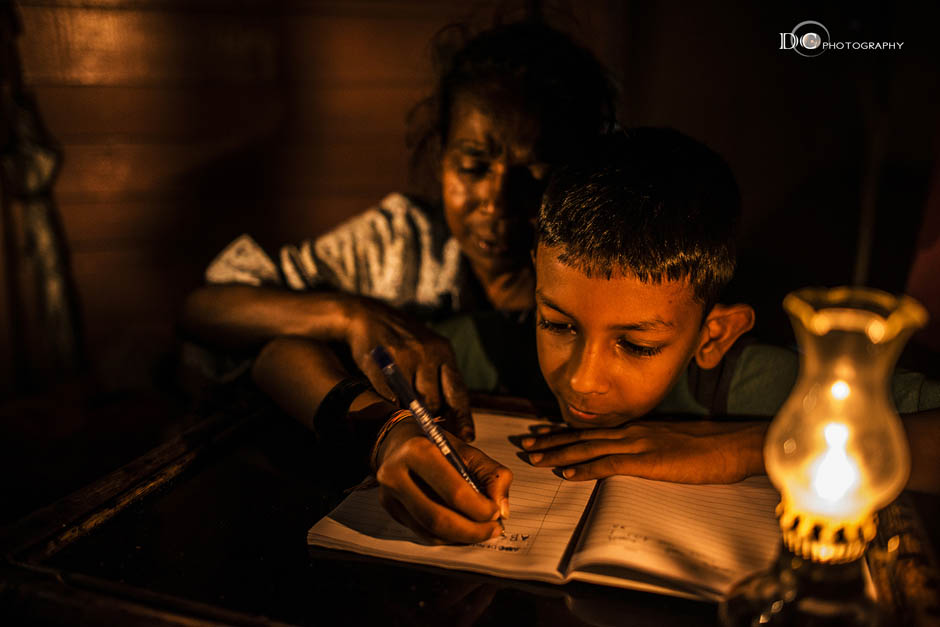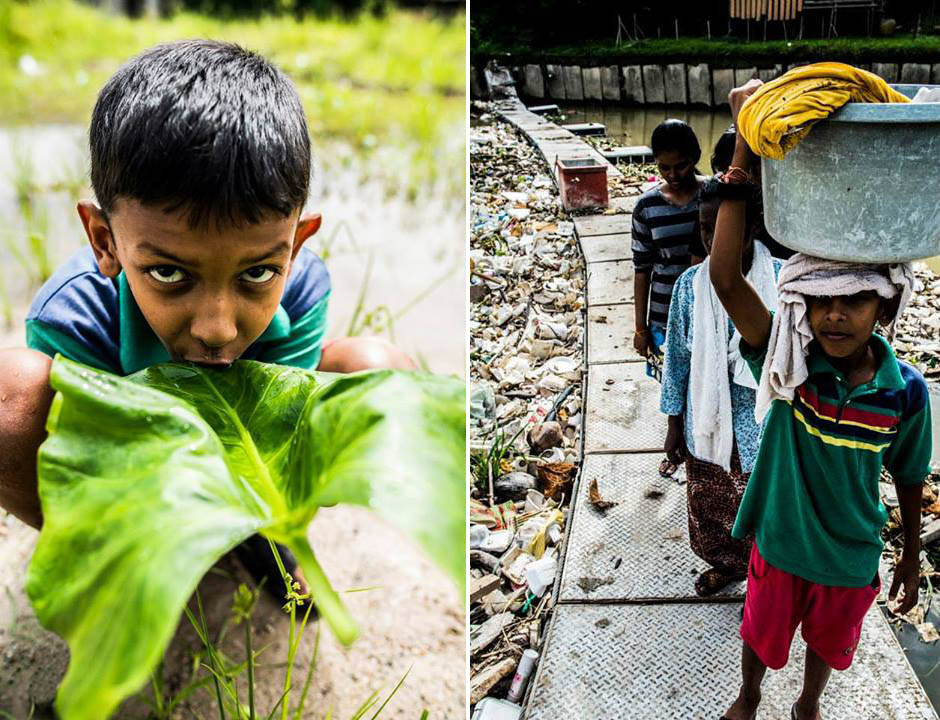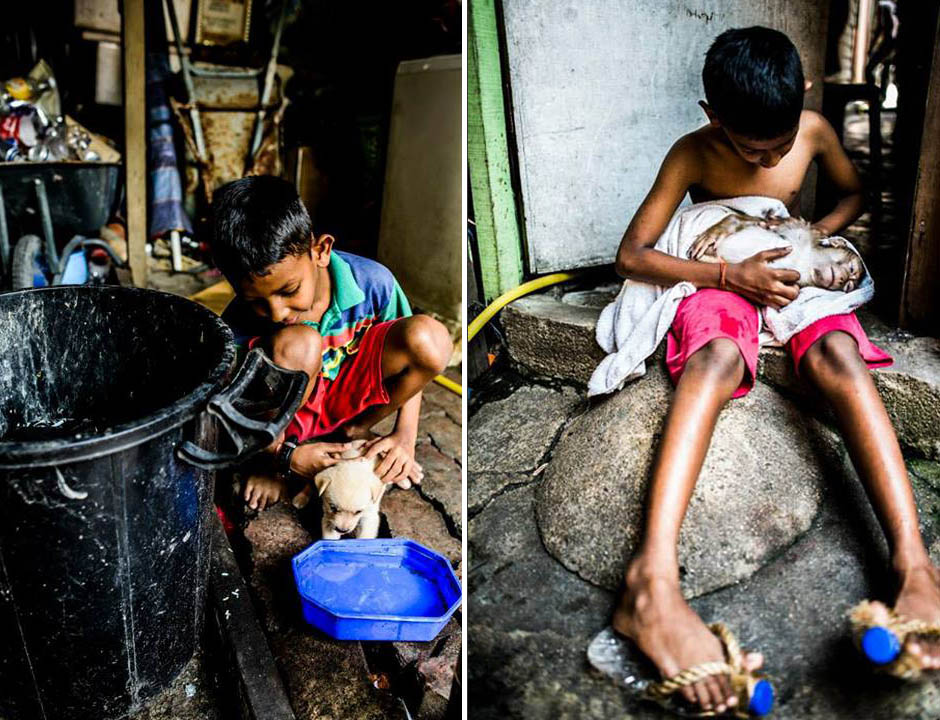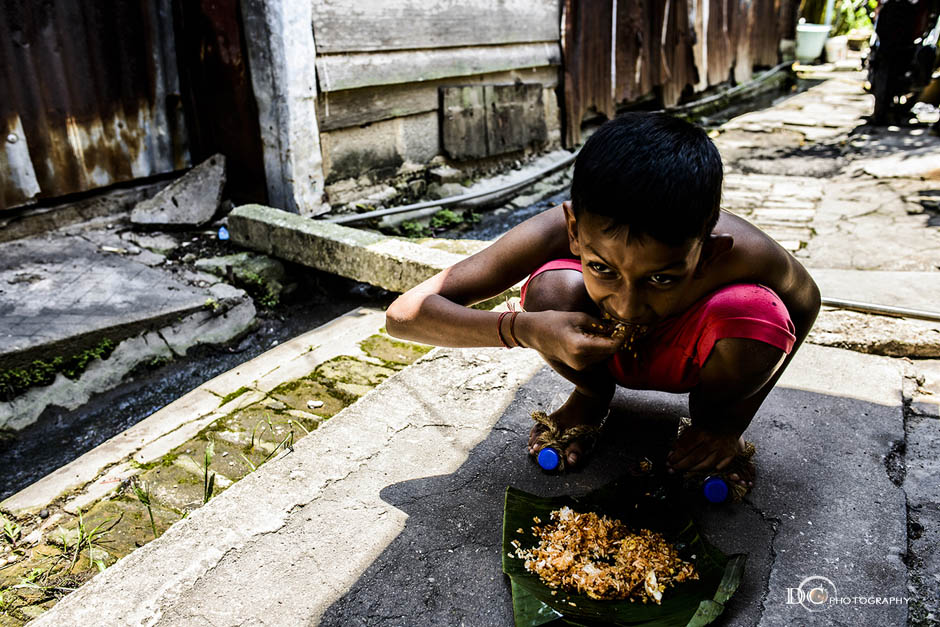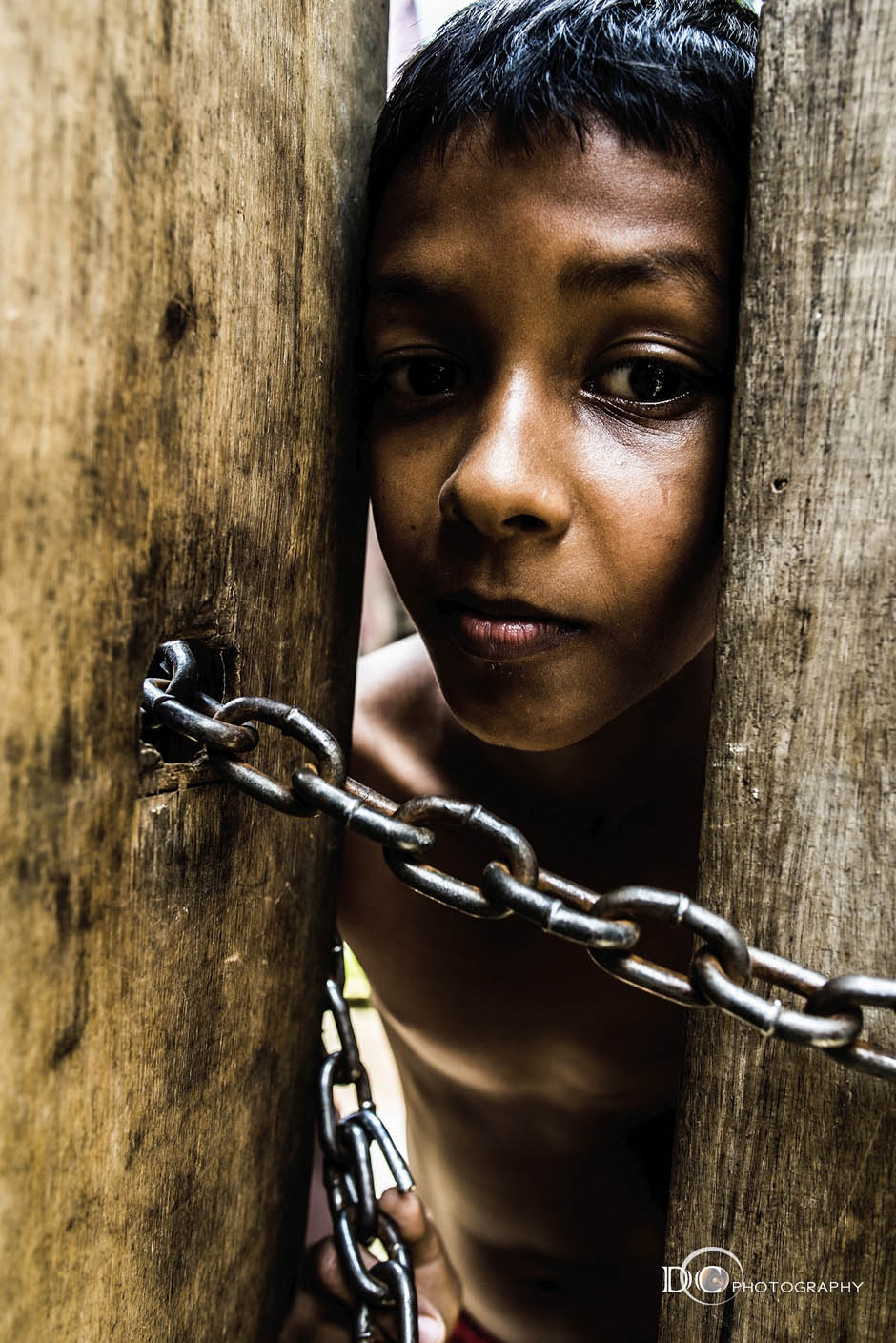[SHARE] Photos Of Six-Year-Old Boy Show Urban Malaysians What It's Like To Live In Poverty
Plastic bottle flip flops aren't only worn in Africa and India. They are used in the outskirts of Kuala Lumpur too.
A Malaysian is entitled to the BR1M aid if they earn less than RM4,000 and possesses a MyKad
Yesterday (Sat, Feb22, 2014) RM4.6 billion was disbursed to some 7.9 Malaysians in the form of BR1M 2014. Each registered Malaysian head of household earning less than RM3,000 a month would have received RM700, while those getting RM3,000-4,000 would receive RM450. Registered single Malaysians earning less than RM2,000 a month would have received RM300 in this scheme. This, according to PM Najib Razak, is the government's way "to change the policy from bulk subsidy to targeted subsidy in stages and shift the savings to the people through BR1M. BR1M is an example of the targeted subsidy". Yes, but a top-down targeted subsidy.
Saya Anak Bangsa Malaysia Poses A Thought Provoking Question: What If You Don't Have One?
See, let's first dwell on who qualifies as a Malaysian. A bearer of a MyKad. And what if you don't have one?
This is Zahka. He is 6-years-old. Zahka lives in the slums of Air Panas in KL, and will unlikely get a chance to go to school.
This is Zahka. He is 6-years-old. He lives in Setapak, KL, and unlikely will get the chance to go to school.
Image via sayaanakbangsamalaysia.netThis is a story of a boy who lives with his mother and father in the slums of Air Panas near Setapak, KL. He goes by the name Zahka. At least that's how he spells it. The six-year-old hasn't been to school, knows only a smattering of Malay and speaks mostly Tamil with his friends and family. He won't be going to school anytime soon if things stay the same.
Zahka is an adopted child. Although his foster mother was poor, she decided to raise him when she found him as a new-born baby in a lorong near their squatters. Both Zahka and his mother does not have a birth certificate nor MyKad.
Zahka is an adopted child. His adopted mother found him as a new-born baby in a lorong near their squatters. Both Zahka and his mother does not have any birth cert or MyKad.
Image via sayaanakbangsamalaysia.net"Zahka is adopted. His mother found him as a new-born baby abandoned in a lorong near their squatters. Despite being poor, she decided this boy had to live. She took him in and nursed him. "His mother, Firiza (that's how she spells it), has never been to school. She doesn't have a MyKad nor a birth cert. Zahka, too, does not have any birth documentation. I just felt hopeless hearing their story. My only way would be to create awareness through these photographs."
Zahka spends the day scavenging for anything of value in the dumpsite near their home. He would sell bottles, cans, and such at the besi buruk outlet for pittance.
Zahka spends the day scavenging for anything of value in the dumpsite near their home. He would sell bottles, can, and such at the besi buruk outlet.
Image via sayaanakbangsamalaysia.net"I tried to start to a conversation but Zahka hardly knew Malay. That evening at home, I decided to pick up new words in Tamil. Google Translate was very helpful," laughed Chia. He noted key phrases in Tamil into his phone and used them the next day with the boy. "It really worked. Zahka laughed at my pronunciation. We shared a simple meal and he shared with me his friends, other kids from the area."
"They look for bottles, cans, discarded steel parts... anything that can fetch a few ringgit at the besi buruk outlet. With that, they get their meals," said Chia. "This was where I first met Zahka. He was digging through the garbage with his hands. When I approached him, he smiled happily (instead of running) away."
The scavenging community in Air Panas live directly off from the Klang River
The scavenging community in Air Panas live directly off the Klang River
Image via sayaanakbangsamalaysia.netWhile we drink treated water from piped sources, the scavenging community in Air Panas live directly off from the Klang River. They wash there amidst the trapped debris of the city-dwellers.
Zahka and his parents are considered fortunate as they live in a rented single room with leaky roofs. Their neighbours, beggars and odd job workers, sleep in alleyways outside the shacks.
Zahka and his parents are considered fortunate as they live in a rented single room with leaky roofs. Their neighbours, beggars and odd job workers, sleep in alleyways outside the shacks.
Image via sayaanakbangsamalaysia.netFor Zahka and his parents, home is a rented single room in a dilapidated zinc-roofed wooden house set among a dozen others. All their belongings fit inside this compartment and no cooking is allowed by the landlord. The roof leaks everywhere and it blisters in the midday sun. His family is considered more fortunate. The entire neighborhood gets filled with beggars and odd-job workers who return to the area towards sundown. They sleep in the alleyways and outside the shacks.
Chia, the photographer, visited Zahka several times over the month. He got to see Zahka's cheerfulness, warmth, big heart, and sincere love for animals.
Chia, the photographer, visited Zahka several times over the month. He got to see Zahka's cheerfulness, big heart, and love for animals.
Image via sayaanakbangsamalaysia.netChia returned to the area half a dozen times in a period of a month to document the life there. Through his visits, he got to know more of Zahka 'The Cheerful'.
"He has such a big heart. He has a natural love for animals and the way he plays with his friends in the neighborhood, you could just tell his warmth. On one of my earlier visits, Zahka had found an injured monkey. It seemed like its legs were broken. Somebody hurt it. Zahka gave the monkey a bath and cared for it lovingly. He said he wanted to keep it as a pet. "When I returned the next day, Zahka was sobbing. I found out the pet monkey died that night."
"No papers, no property, just the flattened plastic bottles which protect his feet. The way things are, he won't be in a classroom, won't be getting out of this intergenerational cycle of poverty. And BR1M won't be coming his way either."
"No papers, no property, just the flattened plastic bottles which protect his feet. The way things are, he won't be in a classroom, won't be getting out of this intergenerational cycle of poverty. And BR1M won't be coming his way either."
Image via sayaanakbangsamalaysia.netSo here's a big-hearted boy raised in a family without identity. No papers, no property, just the flattened plastic bottles which protect his feet. The way things are, he won't be in a classroom, won't be getting out of this intergenerational cycle of poverty. And BR1M won't be coming his way either.
"But is he a lesser human being than you and I? Lesser a Malaysian?"
"But is he a lesser human being than you and I? Lesser a Malaysian?"
Image via sayaanakbangsamalaysia.netSaya Anak Bangsa Malaysia believes the country can be more strategic in improving the lives of the poor and the marginalised. Top-down prescription is not working despite the claims otherwise by the government. For aid to really work, one needs to get into the fine-grain pockets of pain and the ignored because each case is unique. For one it may be about education, for another about a gambling habit or a handicap or of self-esteem. It's not about opening the money tap per se, but how you distribute and use these funds.
Saya Anak Bangsa Malaysia wants to end the unequal distribution of funds. They have produced the Social Inclusion Act and plan to table it as a Private Member's Bill in Parliament.
To this end, SABM and friends have produced the Social Inclusion Act and plan to table it as a Private Member's Bill in Parliament.
Social inclusion embraces the many layers of society and gives every individual a fighting chance to better his or her life. It is premised on the fact that we are human beings, all equal. "Firiza loves Zahka. You can see that so clearly. But she can only do so much," said Chia Hong, as we ended the interview. "I only hope we the people can find a way to do more in a deeper way, a more effective way."
Malaysians, we surely can.
The Social Inclusion Act will address serious marginalisation within Malaysian society to create a socially inclusive society
SOCIAL INCLUSION ACT 2014: An Act to provide for the development and implementation of an integrated plan of action to address serious marginalisation within Malaysian society.
sayaanakbangsamalaysia.netAKTA KETERANGKUMAN SOSIAL 2014: BAHAWASANYA sebuah masyarakat yang terangkum dari segi sosial adalah masyarakat di mana keperluan asas semua ahli masyarakat tersebut dipenuhi agar mereka dapat hidup sentosa.
sayaanakbangsamalaysia.netZahka's story was captured by graphic design graduate Chia Hong. "I wanted to document the difficulties faced by the poor. So many of us refuse to acknowledge they exist, that there isn't such a problem here. But it is around us, as I found out, and bigger than we imagine."
Zahka's story is captured in this photo essay, the final year project by graphic design graduate Chia Hong. His work was exhibited at the recently concluded Art and Design Graduation Show at New Era College, Kajang, and caught the attention of many visitors.
Said Chia: "I wanted to document the difficulties faced by the poor. So many of us refuse to acknowledge they exist, that there isn't such a problem here. But it is around us, as I found out, and bigger than we imagine."
"I was not prepared for the change in atmosphere. To be frank, I was frightened," said the photographer, Chia, about dusk at the settlement. "Among them were drunks, and they seemed aggressive. They kept asking me what I was doing there, what was in my bag, and basically told me to leave."
UPDATE, 24 April 2015: A note from this writer to all who wants to help Zahka, and to all who have reached out to us with offers to help. Thank you for showing us kindness that is deep within us Malaysians.
Zahka's story was posted in 2014. At that time, we tried to get in touch with Saya Anak Bangsa Malaysia and the photographer, Chia Ying, to get more information about his whereabouts. Unfortunately, we were unable to receive a response despite our repeated attempts on various channels.
We do know, however, that Zahka and his family were living in Kampung Baru Air Panas, in Setapak, KL, when the story was published.
What Zahka has done is help many urban Malaysians realise the reality of our income gap and the plight of the forgotten society. Although we are still unable to locate Zahka, we are grateful for what he has taught us.
We believe sharing Zahka's plight to further create awareness is the first step to helping.
We are sincerely touched by the number of Malaysians who have reached out to us offering to help Zahka and his family. We are sorry that we are unable to be more helpful at this point. If any of you do manage to locate Zahka or need help in the search, please contact us at [email protected].
